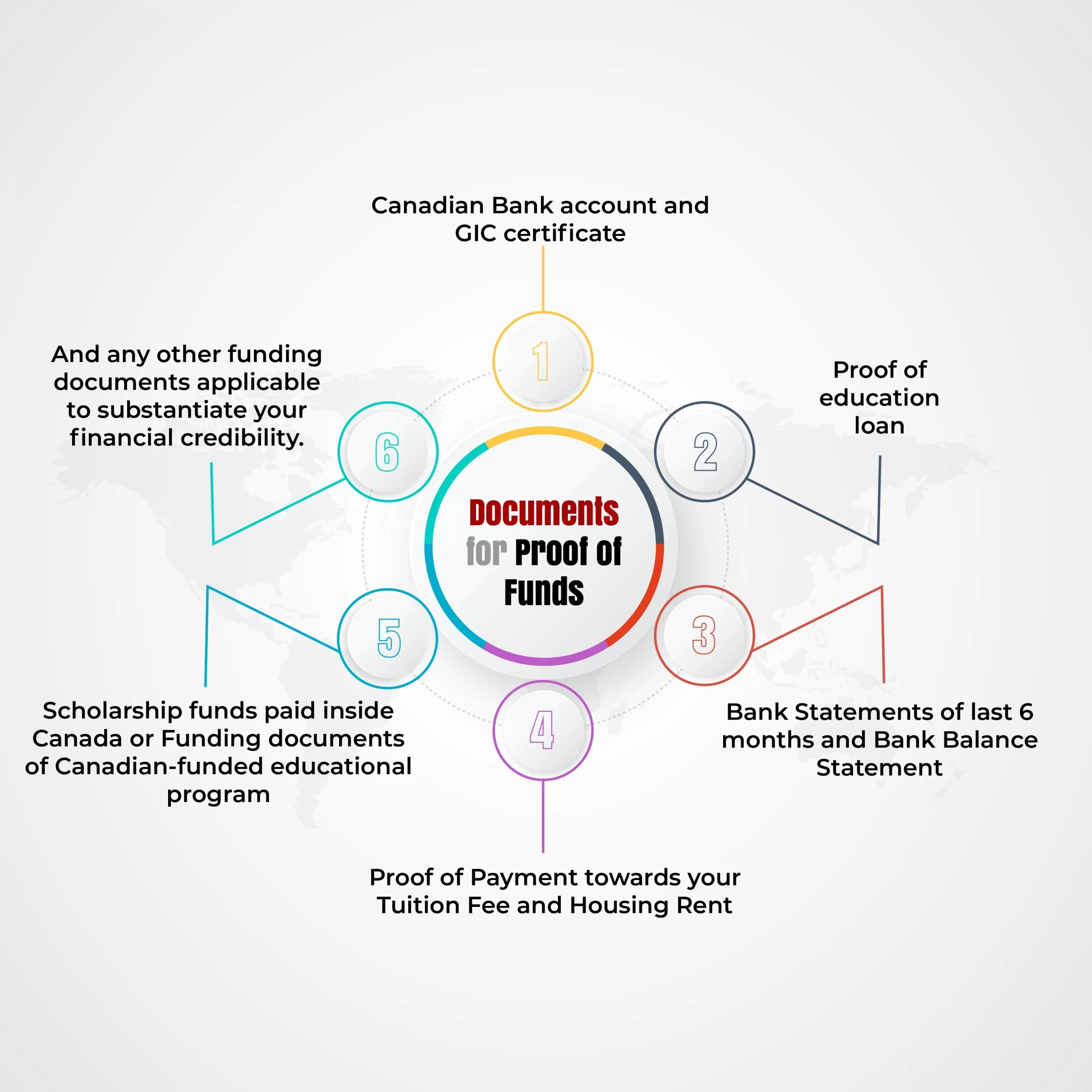Proof of Funds – Overview
Is your intuition driving you to study abroad?
Canada! Canada undoubtedly is an appropriate place for you to study. The welcoming nature of the country, renowned institutions, globally acknowledged degrees, affordable tuition cost, and enjoyable livelihood. All these aspects make Canada a melting pot for international students to plan their higher education there.
But before planning, every student will look for the requirements that one is obliged to meet to study in Canada. One of the important requirements is the funding part. Be it any overseas education destination, financial capability is the first requirement to plan for international education.
Getting admission from a college or a university in Canada is not a hard nut to crack but filing for a visa and getting an approval have a whole lot of processes that must be immaculately carried out. Visa filing is the crucial part where the discretion of your approval lies in, and this is the phase where one’s financial capability is evaluated.
Let’s delve a bit into the funding part…
To prove your financial sufficiency for your Canadian education, you need to submit your proof of funds. This explains about your financial stature to realize your study in Canada.
What is Proof of Funds?
To make your academic visit to Canada hassle-free, you need to prep yourself financially. You must prove to the Canada immigration high commission that you are financially sound. This can be done by enclosing some of the important funding documents that are considered Proof of Funds. This document explains you are financially sufficient and will not be facing any hurdles throughout your stay in Canada.
And Canada is very particular because immigrants and international students should be the form of sources that contribute to the economy of the country and should not become an economic burden instead.
Hence, an individual proven to have financial back up that suffices his or her stay in Canada including tuition fee, living cost and every other expense incurring in the country will be considered an eligible person and will get a blue tick by the Canadian immigration council.
Proof of Funds for my possession?
You may wonder ‘how much amount am I supposed to arrange for my Canada education?
- Students coming to Canada should have secured CAD 10,000, deposited it in a Canadian Bank like CIBC Bank, Scotia Bank or ICICI Bank and should have got a GIC (Guaranteed Investment Certificate) against the amount.
- If the student is accompanied by a family member, an additional CAD 4,000 should be included along with CAD 10,000
- For each additional family member, CAD 3,000 will be included.
| Funds Required (in CAD) | Belongs to |
| 10,000 | The primary applicant (Student) |
| 4,000 | 1 accompanying family member |
| 3,000 | each additional member included |
Note: All the particulars mentioned above are projected excluding the tuition fee. Tuition fee is subject to the discretion of the institution that admits you.
The proof of funds that can be enclosed along with the visa application include,
🍁Canadian Bank account and GIC certificate (as mentioned above)
🍁Proof of education loan (if availed)
🍁Bank Statements of last 6 months and then Bank Balance Statement
🍁Proof of Payment towards your Tuition Fee and Housing Rent
🍁Scholarship funds paid inside Canada or Funding documents of Canadian-funded educational program (if applicable)
🍁And any other funding documents applicable to substantiate your financial credibility
Accepted Documents for Proof of Funds
Some of the financial proofs accepted by the IRCC for Canada student visa application are as follows!
Bank Statement
The easiest way to provide proof of finances or financial support is through bank statements. Your local visa office may ask you to submit bank account statements. This could be done for a specified number of months prior to your application, either of your own bank account or those of your financial sponsor. Make sure the account is in your name if you plan to give bank account statements.
This evidence demonstrates that you have the resources necessary to cover your living and educational costs in Canada. As an alternative, it shows that someone is able to pay for your education and stay in Canada.
These statements may be scanned copies of the bank’s stamped and signed original statements. The original statement must include the duration required by the university of the visa consulate and be printed on the bank’s official letterhead.
Net Worth Certificate
Another important document to increase the financial credibility of your profile is your net worth certificate which substantiates the value of assets and properties you and your family own. This is obtained by approaching a Chartered Accountant who will value the worth of your movable assets and immovable assets and provide a consolidated certificate for your net worth. This can be enclosed along with other supporting documents in your visa application.
Loan Approval Letters
If a student needs money and has access to a bank loan, they must present a legitimate loan approval letter. This can be obtained from the bank that provided you with the loan. This letter, however, must state that the bank loaned you the stated sum in order for you to pursue further education in Canada.
This approval letter, like the bank statements stated before. It must be signed, stamped, and contain the bank’s official letterhead. The exact money to be disbursed should be listed in this letter, along with a commitment to do so.
Payment Receipts
Tuition fee payment receipts and housing bill payment receipts can be enclosed while filing for the visa. Those are the funding proof that will explain the immigration high commission that you are financially prepared for your Canada education.
Scholarship Letters
Students who might be eligible for scholarships from the education institution where they will be enrolled must submit a legitimate scholarship letter. This letter is available from the college or donor organization providing the scholarship. As evidence of their financial support, students who have received a Governmental Grant or Scholarship must present a copy of this as evidence of financial support.
Loan Capability Letters
Loan approval letters should not be confused with loan capability letters. These are given to students by banks and other financial institutions if they agree to lend them money as long as they are admitted to a foreign university.
Consider that you are submitting a loan capability certificate as evidence of your ability to support yourself financially in order to obtain a student visa for Canada. In that scenario, you must make sure it precisely specifies your name, your qualification for the loan, and the financial institution’s conditional pledge to extend the credit. This certificate must be stamped and signed on the business letterhead of the financial institution, much like other bank documents.
What not to do?
1. Not maintaining insufficient funds
Giving proof of funds that are less than the amount that approximates to CAD 40000 including tuition provides the idea that you will not be able to support yourself until finishing your study in Canada. Make sure to meet all funding requirements before filing for the visa!
2. Bulk Deposits
If you plan to deposit a sizable sum into your account and present it as evidence of your ability to support yourself financially when applying for a student visa in Canada, make sure the transfer has been finished at least couple of months beforehand.
3. Withdrawing the amount after obtaining the certificates
Don’t withdraw the funds just after obtaining necessary certificates like bank transaction statement and bank balance certificates. Your bank account might be cross verified and when it is found to have fallen short of funds, your application will be rejected as the visa officer clearly knows you have deposited the funds for the sake of records and certificates.
I hope this blog will be useful to you in a way or the other if you are planning for overseas education in Canada. For more valuable information, stay connected for our blog and newsletters.
We can make you realize your overseas education aspirations in Canada. Our 25 years of expertise in immigration and overseas education services has been helping thousands abroad aspirants study and relocate abroad. Get in touch with our immigration and overseas education counsellors who are just a click away!
Thanks for reading 😊







